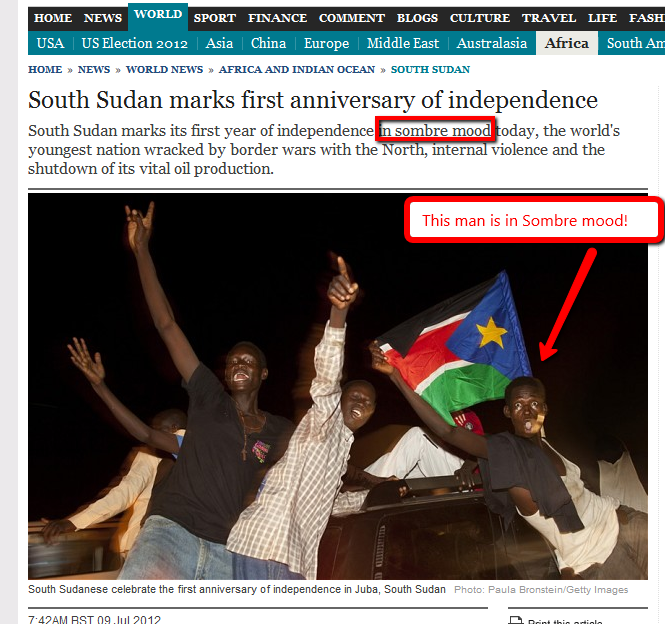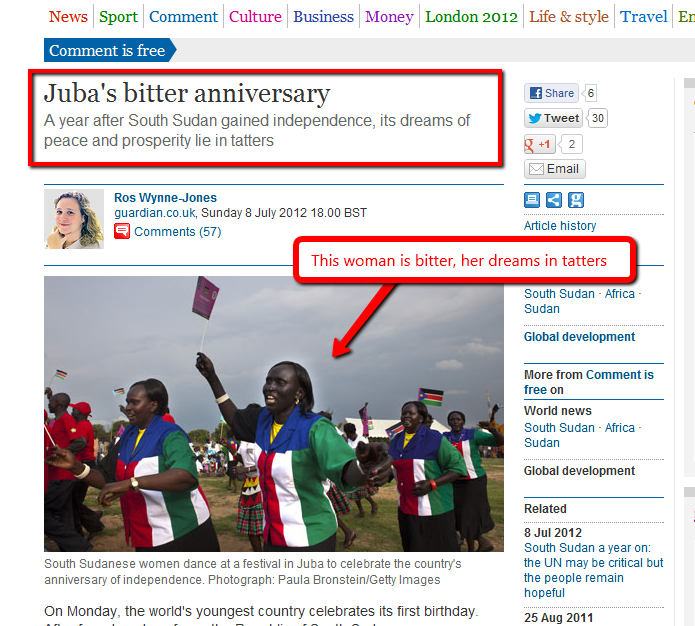This is a guest post by Aggrey Tisa Sabuni, Economic Advisor to the President, Republic of South Sudan.
Foreign Policy magazine recently ranked South Sudan the fourth most "failed state" in the world in its 2012 Failed States Index, which ranks countries according to a list of 12 "state vulnerability" indicators. There are numerous concerns with this index; however, I would like focus my attention on the term "failed state". To fail implies you cannot learn, improve and eventually succeed. Although I do not dispute that South Sudan is fragile, I take issue with the idea that we will never prosper as a nation. Instead of labelling South Sudan as a lost cause, we should be working to identify the roots of our fragility so that we are able to turn around our fortunes. In this regard, I wonder if the readers of this post and the public at large truly understand what "fragility" actually means?
The term "fragile state" conjures up a number of different images, but ultimately it means a country is susceptible to a crisis, whether it is a natural disaster, an economic catastrophe or a security threat that cannot be easily dealt with. Fragility tends to be caused by the absence of a strong and effective government apparatus capable of dealing with crises as they develop, exacerbated by a lack of relative social harmony across different societal groups. Symptoms of fragility include regular outbreaks of internal insecurity, a weak justice system that fails to resolve disputes as they arise, a shortage of qualified and skilled personnel to staff key government institutions, and a lack of basic services to meet needs of the population.
However, fragility is also an opportunity. It is a chance to start over, to build from the foundation up. What is required, however, is patience. When you are building a house the foundation is the first and most important step. It takes more time to complete than the rest of the house. In South Sudan we are building the foundation.
The year since our independence on the 9th July 2011 has been a turbulent one. The Government and our population have been operating under very challenging circumstances and we are learning how to address these challenges. On January 20th the Government made the decision to shutdown of oil production, in response to repeated provocation from the Government of Sudan and the theft of South Sudan’s oil. As a result, we are facing the prospect of losing 98 per cent of our revenue. We have also seen a resurgence of open hostilities in the border regions, rising domestic prices for basic commodities, insecurity from cattle raiding and limited provision of services.
We did not expect it to be an easy year.
Despite these challenges, we have begun to see the fruits of our labour in other important activities. National and State governments have adopted constitutions and are abiding by them. In Jonglei State, we have witnessed a peace accord that has stabilised relationships between the various groups in that State. These actions have undoubtedly helped improve the level of internal security and has promoted an increasingly strong sense of nationhood amongst the population.
In the area of economic policy, we have implemented significant public financial management reforms, which have led to an increase in non-oil revenue collections of over 250 per cent since July 2011. A new currency was successfully introduced under extremely challenging circumstances, but with minimal disruption to the South Sudanese. All of these successes have been achieved under the framework of the South Sudan Development Plan, our first ever national plan, which outlines how best to use Government and donor funds for the development of the country.
These are not insubstantial achievements. They are a direct reflection of a country determined to ensure that its people benefit from improved security and economic prospects.
Despite these successes, we have continued to receive a significant amount of negative press over our actions, particularly the decision to halt oil production. While there is no doubt that circumstances have slowed down our progress, the fact remains that the complex nature of our negotiations with the Government of Sudan disguises their unwillingness to negotiate and compromise a settlement. Until the political challenges with Sudan are resolved, we will continue to be hampered in our efforts to build a solid foundation for South Sudan. As such, this is the precise moment where we need our friends in the international community to stand up, to acknowledge our successes and failures, and to actively support the efforts of the government in dealing with its challenges.
South Sudan is not a failed state. We are a country rich in potential but hampered by short term fragility. Managing the challenges we face is not a simple task. I strongly believe that South Sudan can utilise its abundant resources for the benefit of the population and the region if an adequate foundation is built. However, this processes requires the patience and sustained support of the international community. We will undoubtedly make mistakes along the way, but with the support of our friends, we will be able build a strong and prosperous nation.


